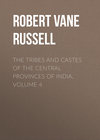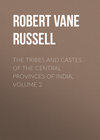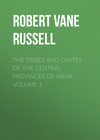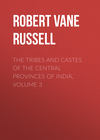Читать книгу: «The Tribes and Castes of the Central Provinces of India, Volume 4», страница 57
16. The sacred gur (sugar)
After each murder they had a sacrificial feast of gur or unrefined sugar. This was purchased to the value of Rs. 1–4, and the leader of the gang and the other Bhurtotes (stranglers) sat on a blanket with the rest of the gang round them. A little sugar was dropped into a hole and the leader prayed to Devi to send them some rich victims. The remainder of the sugar was divided among all present. One of them gave the jhirni or signal for strangling and they consumed the sugar in solemn silence, no fragment of it being lost They believed that it was this consecrated gur which gave the desire for the trade of a Thug and made them callous to the sufferings of their victims, and they thought that if any outsider tasted it he would at once become a Thug and continue so all his life. When Colonel Sleeman asked702 a young man who had strangled a beautiful young woman in opposition to their rules, whether he felt no pity for her, the leader Feringia exclaimed: “We all feel pity sometimes, but the gur of the Tuponi (sacrifice) changes our nature. It would change the nature of a horse. Let any man once taste of that gur and he will be a Thug, though he knows all the trades and have all the wealth in the world. I never wanted food; my mother’s family was opulent, her relations high in office. I have been high in office myself, and became so great a favourite wherever I went that I was sure of promotion; yet I was always miserable while absent from my gang and obliged to return to Thuggee. My father made me taste of that fatal gur when I was yet a mere boy; and if I were to live a thousand years I should never be able to follow any other trade.”
The eating of this gur was clearly the sacrificial meal of the Thugs. On the analogy of other races they should have partaken of the body of an animal god at their sacrificial meal, and if the goddess Kāli is the deified tiger, they should have eaten tiger’s flesh. This custom, if it ever existed, had been abandoned, and the gur would in that case be a substitute; and as has been seen the eating of the gur was held to confer on them the same cruelty, callousness and desire to kill which might be expected to follow from eating tiger’s flesh and thus assimilating the qualities of the animal. Since they went unarmed as a rule, in order to avoid exciting the suspicions of their victims, it would be quite impossible for them to obtain tiger’s flesh, except by the rarest accident; and the gur might be considered a suitable substitute, since its yellow colour would be held to make it resemble the tiger.
17. Worship of ancestors
The Thugs also worshipped the spirits of their ancestors. One of these was Dādu Dhira, an ancient Thug of the Barsote class, who was invoked at certain religious ceremonies, when liquor was drunk. Vows were made to offer libations of ardent spirits to him, and if the prayer was answered the worshipper drank the liquor, or if his caste precluded him from doing this, threw it on the ground with an expression of thanks. Another deity was the spirit of Jhora Nāik, who was a Muhammadan. He and his servant killed a man who had jewels and other articles laden on a mule to the value of more than a lakh and a half. They brought home the booty, assembled all the members of their fraternity within reach, and honestly divided the whole as if all had been present The Thugs also said that Nizām-ud-dīn Aulia, a well-known Muhammadan saint, famed for his generosity, whose shrine is near Delhi, had been a Thug, at any rate in his younger days. He distributed so much money in charity that he was supposed to be endowed with a Dustul Ghīb or supernatural purse; and they supposed that he obtained it by the practice of Thuggee. Orthodox Muhammadans would, however, no doubt indignantly repudiate this.
18. Fasting
Whenever they set out on a fresh expedition the first week was known as Satha (seven). During this period the families of those who were engaged in it would admit no visitors from the relatives of other Thugs, lest the travellers destined for their own gang should go over to these others; neither could they eat any food belonging to the families of other Thugs. During the Satha period the Thugs engaged in the expedition ate no animal food except fish and nothing cooked with ghī (melted butter). They did not shave or bathe or have their clothes washed or indulge in sexual intercourse, or give away anything in charity or throw any part of their food to dogs or jackals. At one time they ate no salt or turmeric, but this rule was afterwards abandoned. But if the Sourka or first murder took place within the seven days they considered themselves relieved by it from all these restraints.
19. Initiation of a novice
A Thug seldom attained to the office of Bhurtote or strangler until he had been on several expeditions and acquired the requisite courage or insensibility by slow degrees. At first they were almost always shocked or frightened; but after a time they said they lost all sympathy with the victims. They were first employed as scouts, then as buriers of the dead, next as Shamsias or holders of hands, and finally as stranglers. When a man felt that he had sufficient courage and insensibility he begged the oldest and most renowned Thug of the gang to make him his chela or disciple. If his proposal was accepted he awaited the arrival of a suitable victim of not too great bodily strength. While the traveller was asleep with the gang at their quarters the guru or preceptor took his disciple into a neighbouring field, followed by three or four old members of the gang. Here they all faced in the direction in which the gang intended to move, and the guru said, “Oh Kāli, Kunkāli, Bhudkāli,703 Oh Kāli, Mahā Kāli, Kalkatāwāli! If it seemeth to thee fit that the traveller now at our lodging should die by the hands of this thy slave, vouchsafe, we pray thee, the omen on the right.” If they got this within a certain interval the candidate was considered to be accepted, and if not some other Thug put the traveller to death and he had to wait for another chance. In the former case they returned to their quarters and the guru took a handkerchief and tied the slip-knot in one end of it with a rupee inside it. The disciple received it respectfully in his right hand and stood over the victim with the Shamsia or holder by his side. The traveller was roused on some pretence or other and the disciple passed the handkerchief over his neck and strangled him. He then bowed down to his guru and all his relations and friends in gratitude for the honour he had obtained. He gave the rupee from the knot with other money, if he had it, to the guru, and with this sugar or sweetmeats were bought and the gur sacrifice was celebrated, the new strangler taking one of the seats of honour on the blanket for the first time. The relation between a strangler and his guru was considered most sacred, and a Thug would often rather betray his father than the preceptor by whom he had been initiated. There were certain classes of persons whom they were forbidden to kill, and they considered that the rapid success of the English officers in finally breaking up the gangs was to be attributed to the divine wrath at breaches of these rules. The original rule704 was that the Sourka or first victim must not be a Brāhman, nor a Saiyad, nor any very poor man, nor any man with gold on his person, nor any man who had a quadruped with him, nor a washerwoman, nor a sweeper, nor a Teli (oilman), nor a Bhāt (bard), nor a Kāyasth (writer), nor a leper, dancing-woman, pilgrim or devotee. The reason for some of these exemptions is obvious: Brāhmans, Muhammadan Saiyads, bards, religious mendicants and devotees were excluded owing to their sanctity; and sweepers, washermen and lepers owing to their impurity, which would have the same evil and unlucky effect on their murderers as the holiness of the first classes. A man wearing gold ornaments would be protected by the sacred character of the metal; and the killing of a poor man as the first victim would naturally presage a lack of valuable booty during the remainder of the expedition. Telis and Kāyasths are often considered as unlucky castes, and even in the capacity of victims might be held to bring an evil fortune on their murderers.
20. Prohibition of murder of women
Another list is given of persons whom it was forbidden to kill at any time, and of these the principal category was women. It was a rule of all Thugs that women should not be murdered, but one which they constantly broke, for few large parties consisted solely of men, and to allow victims to escape from a party would have been a suicidal policy. In all the important exploits related to Colonel Sleeman the women who accompanied victims were regularly strangled, with the occasional exception of young girls who might be saved and married to the sons of Thug leaders. The breach of the rule as to the murder of women was, however, that which they believed to be specially offensive to their patroness Bhawāni; and no Thug, Colonel Sleeman states, was ever known to offer insult either in act or speech to the women whom they were about to murder. No gang would ever dare to murder a woman with whom one of its members should be suspected of having had criminal intercourse. The murder of women was especially reprobated by Hindus, and the Muhammadan Thugs were apparently responsible for the disregard of this rule which ultimately became prevalent, as shown by the dispute over the killing of a wealthy old lady,705 narrated by one of the Thugs as follows: “I remember the murder of Kāli Bībi well; I was at the time on an expedition to Baroda and not present, but Punua must have been there. A dispute arose between the Musalmāns and Hindus before and after the murder. The Musalmāns insisted upon killing her as she had Rs. 4000 of property with her, but the Hindus would not agree. She was killed, and the Hindus refused to take any part of the booty; they came to blows, but at last the Hindus gave in and consented to share in all but the clothes and ornaments which the woman wore. Feringia’s father, Parasrām Brāhman, was there, and when they came home Parasrām’s brother, Rai Singh, refused to eat, drink or smoke with his brother till he had purged himself from this great sin; and he, with two other Thugs, a Rājpūt and a Brāhman, gave a feast which cost them a thousand rupees each. Four or five thousand Brāhmans were assembled at that feast. Had it rested here we should have thrived; but in the affair of the sixty victims women were again murdered; in the affair of the forty several women were murdered; and from that time we may trace our decline.”
21. Other classes of persons not killed
Another rule was that a man having a cow with him should not be murdered, no doubt on account of the sanctity attaching to the animal. But in one case of a murder of fourteen persons including women and a man with a cow at Kotri in the Damoh District, the Thugs, having made acquaintance with the party, pretended that they had made a vow to offer a cow at a temple in Shāhpur lying on their road and persuaded the cow’s owner to sell her to them for this sacred purpose, and having duly made the offering and deprived him of the protection afforded by the cow, they had no compunction in strangling him with all the travellers. Travellers who had lost a limb were also exempted from death, but this rule too was broken, as in the case of the native officer with his two daughters who was murdered by the Thugs he had befriended; for it is recorded that this man had lost a leg. Pilgrims carrying Ganges water could not be killed if they actually had the Ganges water with them; and others who should not be murdered were washermen, sweepers, oil-vendors, dancers and musicians, carpenters and blacksmiths, if found travelling together, and religious mendicants. The reason for the exemption of carpenters and blacksmiths only when travelling together may probably have been that the sacred pickaxe was their joint handiwork, having a wooden handle and an iron head; and this seems a more likely explanation than any other in view of the deep veneration shown for the pickaxe. Maimed persons would probably not be acceptable victims to the goddess, according to the rule that the sacrifice must be without spot or blemish. The other classes have already been discussed under the exemption of first victims. Among the Deccan Thugs if a man strangled any victim of a class whom it was forbidden to kill, he was expelled from the community and never readmitted to it. This was considered a most dreadful crime.
22. Belief in omens
The Thugs believed that the wishes of the deity were constantly indicated to them by the appearance or cries of a large number of wild animals and birds from which they drew their omens; and indeed the number of these was so extensive that they could never be at a loss for an indication of the divine will, and difficulties could only arise when the omens were conflicting. As a general rule the omen varied according as it was heard on the left hand, known as Pilhao, or the right, known as Thibao. On first opening an expedition an omen must be heard on the left and be followed by one on the right, or no start was made; it signified that the deity took them first by the left hand and then by the right to lead them on. When they were preparing to march or starting on a road, an omen heard on the left encouraged them to go on, but if it came from the right they halted. When arriving at their camping-place on the other hand the omen on the right was auspicious and they stayed, but if it came from the left the projected site was abandoned and the march continued. In the case of the calls of a very few animals these rules were reversed, left and right being transposed in each instance. The howl of the jackal was always bad if heard during the day, and the gang immediately quitted the locality, leaving untouched any victims whom they might have inveigled, however wealthy. The jackal’s cry at night followed the rule of right and left. The jackal was probably revered by the Thugs as the devourer of corpses. The sound made by the lizard was at all times and places a very good omen; but if a lizard fell upon a Thug it was bad, and any garment touched by it must be given away in charity. The call of the sāras crane was a very important omen, and when heard first on the left and then on the right or vice versa according to the rules given above, they expected a great booty in jewels or money. The call of the partridge followed the same rules but was not of so much importance. That of the large crow was favourable if the bird was sitting on a tree, especially when a tank or river could be seen; but if the crow was perched on the back of a buffalo or pig or on the skeleton of any animal, it was a bad omen. Tanks or rivers were likely places for booty in the shape of resting travellers, whose death the appearance of the crow might portend; whereas in the other positions it might prognosticate a Thug’s own death. The chirping of the small owlet was considered to be a bad omen, whether made while the bird was sitting or flying; It was known as chiraiya and is a low and melancholy sound seldom repeated. They considered it a very bad omen to hear the hare squeaking; this, unless it was averted by sacrifices, signified, they said, that they would perish in the jungles, and the hare or some other animal of the forest would drink water from their skulls. “We know that the hare was used in Brittany as an animal of augury for foretelling the future; and all animals of augury were once venerated.”706 The hare has still some remnant of sanctity among the Hindus. Women will not eat its flesh, and men eat the flesh of wild hares only, not of tame ones. It seems likely that the hare may have been considered capable of foretelling the future on account of its long ears. The omen of the donkey was considered the most important of all, whether it threatened evil or promised good. It was a maxim of augury that the ass was equal to a hundred birds, and it was also more important than all other quadrupeds. If they heard its bray on the left on the opening of an expedition and it was soon after repeated on the right, they believed that nothing on earth could prevent their success during that expedition though it should last for years. The ass is the sacred animal of Sītala, the goddess of smallpox, who is a form of Kāli. The ears and also the bray of the ass would give it importance.
The noise of two cats heard fighting was propitious only during the first watch of the night; if heard later in the night it was known as ‘Kāli ki mauj’ or ‘Kāli’s temper,’ and threatened evil, and if during the daytime as ‘Dhāmoni707 ki mauj,’ and was a prelude of great misfortune; while if the cats fell from a height while fighting it was worst of all. The above shows that the cat was also the animal of Kāli and is a point in favour of her derivation from the tiger; and on this hypothesis the importance of the omen of the cat is explained. If they obtained a good omen when in company with travellers they believed that it was a direct order from heaven to kill them, and that if they disobeyed the sign and let the travellers go they would never obtain any more victims.708
23. Omens and taboos
If a mare dropped a foal in their camp while they were travelling, they were all contaminated or came under the Itak; and the only remedy for this was to return home and start the journey afresh. Various other events709 also produced the Itak, especially among the Deccan Thugs; these were the birth of a child in a Thug family; the first courses of a Thug’s daughter; a marriage in a Thug’s family; a death of any member of his family except an infant at the breast; circumcision of a boy; a buffalo or cow giving calf or dying; and a cat or dog giving a litter or dying. If a party fell under the Itak or contamination at a time when it was extremely inconvenient or impossible to return home, they sometimes marched back for a few miles and slept the night, making a fresh start in the morning, and this was considered equivalent to beginning a new journey after getting rid of the contamination. If any member of the party sneezed on setting out on an expedition or on the day’s march, it was a bad omen and required expiatory sacrifices; and if they had travellers with them when this omen occurred, these must be allowed to escape and could not be put to death. Omens were also taken from the turban, without which no Thug, except perhaps in Bengal, would travel.710 If a turban caught fire a great evil was portended, and the gang must, if near home, return and wait for seven days. But if they had travelled for some distance an offering of gur (sugar) was made, and the owner of the turban alone returned home. If a man’s turban fell off it was also considered a very bad omen, requiring expiatory sacrifices. The turban is important as being the covering of the head, which many primitive people consider to contain the life or soul (Golden Bough). A shower of rain falling at any time except during the monsoon period from June to September was also a bad omen which must be averted by sacrifices. Prior to the commencement711 of an expedition a Brāhman was employed to select a propitious day and hour for the start and for the direction in which the gang should proceed. After this the auspices were taken with great solemnity and, if favourable omens were obtained, the party set out and made a few steps in the direction indicated; after this they might turn to the right or left as impediments or incentives presented themselves. If they heard any one weeping for a death as they left the village, it threatened great evil; and so, too, if they met the corpse of any one belonging to their own village, but not that of a stranger. And it was also a bad omen to meet an oil-vendor, a carpenter, a potter, a dancing-master, a blind or lame man, a Fakīr (beggar) with a brown waistband or a Jogi (mendicant) with long matted hair. Most of these were included in the class of persons who might not be killed.
Покупайте книги и получайте бонусы в Литрес, Читай-городе и Буквоеде.
Участвовать в бонусной программе













